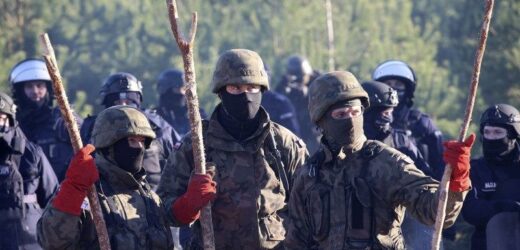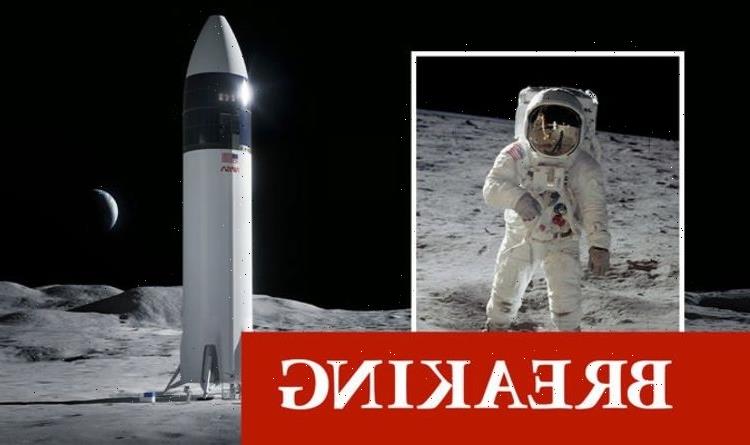Kuznica, Poland: As you approach Poland’s border with Belarus, a message from an unrecognised number flashes up on your phone.
“The Polish border is sealed,” it reads. “BLR authorities told you lies. Go back to Minsk! Don’t take any pills from Belarusian soldiers.”
The welcome message from the Polish government is directed at the thousands of Iraqi and other immigrants massed at the border – but it also tells anyone else with a foreign phone number that they have arrived at the front line of a geopolitical crisis.
Polish border army units stand guard as migrants gather near the Kuznica border crossing on the Belarusian-Polish border.Credit:Getty
Early yesterday, Polish authorities closed the frontier crossing at Kuznica, shutting down one of two arterial roads between Warsaw and Minsk in a bid to turn back a tide of men, women and children conscripted into dictator Alexander Lukashenko’s assault on Europe.
Lukashenko has insisted he did not want armed confrontation but claimed his Russian allies could be drawn into the row over migrants on the border with Poland.
“We aren’t bullying,” Lukashenko said. “Because we know that if, God forbid, we make some mistake, if we stumble, it will immediately draw Russia into this whirlpool. And this is the largest nuclear power.”
Pawns in a Belarus’ political calculation: Migrants from the Middle East have been lured to the Belarus-Poland border near Grodno, Belarus.Credit:AP
His intervention came after the European Commission condemned him for acting like a “gangster” by using migrants as political pawns.
Belarus has been accused of sending refugees to the EU’s border in an attempt to destabilise the bloc in retaliation for sanctions.
Russian Foreign Minister Sergei Lavrov on Tuesday suggested that the EU could provide financial assistance to Belarus in order to encourage it to stop migrants from crossing into the bloc.
“Yesterday during certain political expert discussions it was said: why when refugees were coming from Turkey did the EU provide financing so that they stayed in the Turkish republic? Why is it not possible to help the Belarusians in the same way?” said Lavrov.
Poland has tried to scare people away by issuing dire warnings about Belarusian soldiers trying to poison immigrants – apparently based on a report about a man falling ill after crossing the border earlier this year.
According to the Polish interior ministry, migrants have been given opioids and psychotropic drugs by Belarusian security forces.
Stanislaw Zaryn, a leading Polish security official, said that in the summer a group of migrants who had crossed into Lithuania had been given methadone. The migrants were allegedly told that the pills would help them “survive” the trek across the border.
A migrant carries firewood as other migrants from the Middle East and elsewhere gather at the Belarus-Poland border near Grodno, Belarus.Credit:AP
The government here has already deployed more than 12,000 troops, police, and national guardsmen into the border area in a bid to block the route.
In an effort to enforce a media blackout in the zone, it has also closed the border area to journalists, aid agencies, and NGOs. Reporters are held at a police checkpoint in the woods two and half miles from the frontier.
But even from that distance, it was clear yesterday that Poland’s deterrent efforts have not yet ended this crisis.
In the distance, a helicopter can be seen circling low over the birch forest to the east, keeping an eye on the stand-off. Then the silence is shattered as a dozen vehicles with sirens and lights blazing come screaming out of the sunset.
They careen through a police checkpoint without slowing and disappear over the next rise towards Belarus.
They are followed by heavy green army lorries packed with men in camouflage and full combat gear, balaclavas pulled up over their lower faces.
Much of what we know about what is happening up the road comes from images and footage released selectively by either government, supplemented by snippets of social media posted by the refugees themselves.
Put together, these fragments are enough to create a terrifying picture of how the geopolitical stand-off is fermenting a humanitarian crisis.
Aerial footage filmed by a Polish army helicopter flying along the frontier showed hundreds, possibly thousands, of tents pitched among the trees against the Belarusian side of the border fence.
Other images released showed men in camouflage and masks, who the Polish authorities said were Belarusian police or soldiers.
Similar footage released by the State Committee of Belarus showed hundreds of policemen and vehicles drawn up in long lines on the Polish side of the fence, ready to respond to any effort to break through.
But it is the images from the refugees – many of them Iraqi Kurds – that paint the most desperate picture.
Men, women and children huddle around camp fires and braziers. In some places they are pushed so close to the concertina razor wire of the border fence it sometimes looks as if they are clinging to it for warmth.
It is freezing cold here. Frost barely lifts from the forest floor even in the middle of the day, and very soon the winter snows will begin to fall.
One video, filmed early on Tuesday, showed a man in military uniform standing among a crowd of migrants crouched next to the barbed wire fence.
He casually raises his rifle with one hand, lets out a burst of automatic fire, then turns to point it at a crowd of seated refugees. It is not apparent from the footage who or what he is shooting at.
“The special zone is there so no one can see what is happening,” said Monika Matus of Gruppa Granica, a loose alliance of NGOs and volunteers who have been running a “clandestine” humanitarian operation to assist asylum seekers who make it through.
“We don’t know how many people are still trapped – and Lukashenko is still flying in people who are basically pawns in the game, and pushing them through the fence.”
Gruppa Granica is playing a role that would normally be filled by an aid organisation or United Nations agencies such as the UNHCR and the International Organisation for Migration.
If this were a war, the sudden arrival of thousands at Kuznica, dozens of miles north of the forest, would be equivalent to the surprise opening of a new front. However, the casualties in this conflict are not soldiers but civilians seeking a better life. Many are already at risk of hypothermia, dehydration, and malnourishment.
“We don’t want to start finding dead bodies in the forest. But it is going to start happening sooner rather than later if this carries on,” said Ms Matus.
Telegraph, London
Get a note direct from our foreign correspondents on what’s making headlines around the world. Sign up for the weekly What in the World newsletter here.
Most Viewed in World
From our partners
Source: Read Full Article





